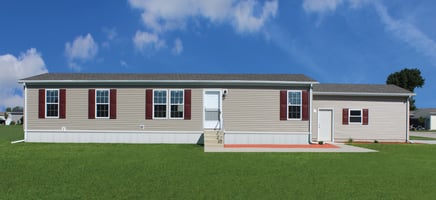Our water heaters serve a crucial purpose in our homes, providing us with hot water for bathing and...
Tank vs. Tankless Water Heaters: Why Tanks Are Better

Water heaters are essential appliances in homes. Whether you want to take a hot shower, wash laundry, or do the dishes, you rely on water heaters to provide a steady supply of hot water.
When shopping for a new water heater, you’ll find two primary options: tank and tankless systems. While both devices serve the same purpose of bringing warm water to your home, they have several differences. Compare the differences between tank and tankless water heaters and discover why tanks are better.
Tank Water Heaters
Tank water heaters have existed for decades and are the most popular choice among homeowners. This system features a large, insulated tank that stores and heats water. When you turn on a hot water faucet, hot water is drawn from the top of the tank, while cold water enters through a dip tube at the bottom to be heated by either gas or electricity.
The Pros of Tank Water Heaters
Low Installation Costs
Tank water heaters have relatively low installation costs, as they are traditional appliances. Because of this, installers rarely have to make modifications to the home, which makes the process straightforward.
Reliable Hot Water Supply
Water is a necessity, and you don’t want to waste money on a system that only supplies it occasionally! Since tank water heaters store hot water, you have a steady supply of hot water whenever you need it without waiting for the system to heat up.
Easy Maintenance

Life is busy enough, so nobody wants to buy a high-maintenance appliance that requires constant work. Since tank water heaters are relatively simple, caring for them is straightforward. Maintenance typically includes checking and replacing the anode rod, flushing out sediment buildup, and tightening connections.
The Cons
Higher Energy Costs
Despite their reliability, tank water heaters require continuous energy to maintain the temperature of stored water. This constant energy demand, known as standby heat loss, can increase operating costs. If you don’t use a lot of hot water or have a small tank, the energy consumption may not be as significant since the system will use less energy.
Limited Hot Water Supply
Tank water heaters have a fixed capacity of 60–80 gallons, but this doesn’t pose an issue for most homeowners. You would have to use a lot of water in a short period, such as taking a bath while doing a load of laundry. Additionally, the system typically replenishes its hot water after approximately one to two hours.
What Are Tankless Water Heaters?
Tankless water heaters operate by heating water on demand rather than storing it in a tank. When you turn on a hot water tap, cold water flows into the unit, where a gas burner or electric element quickly heats it. This process provides hot water on demand, offering a continuous supply as long as the unit can handle the flow rate.
The Pros
Unlimited Hot Water
Since tankless systems heat water as needed, they provide an uninterrupted supply of hot water. This means you can take back-to-back hot showers, run the dishwasher, and take a bath without worrying about the water from the faucet turning cold.
Energy Efficiency
Tankless water heaters only use energy when you need hot water, unlike traditional tanks that continuously heat it. By eliminating the need to maintain the temperature of stored water, they can achieve efficiency ratings, which could reduce your bills.
The Cons
Complex Installation
Most builders design homes with tank water heaters in mind, so installing a tankless system can create challenges. These systems are also more complex than traditional tank water heaters, as they require a larger gas line, special venting, and rearranging the piping in your home. This can also result in additional installation costs, which may not make them cost-effective.
Power Dependency
Tankless water heaters rely on electricity or gas. If you experience a power outage or issues with your gas supply, you may also temporarily lose access to hot water.
Inconsistent Water Temperature
Tankless systems may struggle to maintain consistent water temperatures when multiple appliances are in use simultaneously. High-demand functions, which run numerous water sources at once, can exceed the unit’s capacity and result in fluctuations and dissatisfaction among users.
Why Tank Water Heaters Are Best

When it comes down to tank versus tankless water heaters, tanks are better. Not only are they more affordable and easier to install, but they also provide a consistent supply of hot water. Let’s take a closer look at the comparisons between both systems.
Ease of Installation
Tank water heaters are easier to install than tankless models, especially in manufactured homes, due to their compatibility with existing utility layouts. Their straightforward design and standardized connections make the installation process quicker and more cost-effective compared to tankless systems.
Space Compatibility
Nobody wants a system that takes up a lot of space because this means wasted potential for your home. If you live in a small or manufactured house, maintaining open areas becomes even more important.
Most manufactured home designers create areas for a water heater tank so homeowners don’t have to worry. These spaces offer adequate ventilation and access points for your mobile water heater. On the other hand, the additional clearance requirements of tankless systems may limit the available space, leading to inconvenience or design compromises.
Reliability
When you purchase a water heater, you don’t want a system that can fail due to outside factors, such as a power failure. This can mean you’ll go hours or days without warm water. Tank systems are more reliable because they continue to produce hot water even during a power outage.
Contact Installers
Tank water heaters ultimately align better with the practical needs of manufactured homeowners. Capitol Supply & Services has water heaters and water heater parts designed for manufactured homes. When you buy one of our gas or electric tank water heaters, our team will also install it for you.
Buying the right water heater for your home impacts your comfort, energy efficiency, and long-term costs. Whether you prioritize ease of installation, reliability, or affordability, selecting the right water heater ensures you’ll enjoy consistent hot water!



